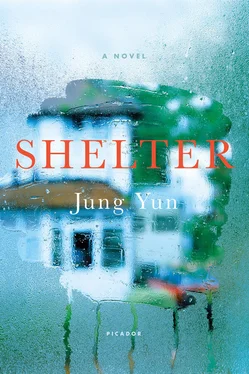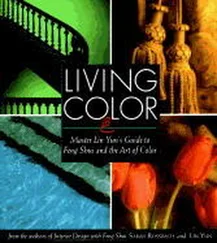Kyung shuts the door as soon as he drives off. “What was all that about?” he asks.
“What do you mean?”
“Why were you thanking him like that?”
“I didn’t think I’d be able to go back to my house for weeks.”
“I’m talking about the”—he hesitates to use the word—“investigation,” which might remind her of the events that need investigating. “I’m not talking about the house.”
“Well, I like him.”
“I can tell, but what does liking him have to do with anything?”
Mae turns toward the stairs, using the banister to pull herself up a step at a time. “He was nice to me that day…”
She leaves the sentence unfinished, but Kyung feels the unspoken like a blow to the chest. He was nice to me that day — not like you .
* * *
Kyung and his parents immigrated to the States when he was four. Jin had just finished his Ph.D., graduating with honors at the top of his class. His tenure-track job offer from an American research university made him the pride and envy of his classmates, who threw him a going-away party that seemed lavish for the times. Kyung still remembers the cake, a tall white one that tilted off to the side, and a gift of three new suitcases, all in matching green plaid. Life seemed very big to him back then. A big party, a big trip, a big plane taking them away, carrying their plaid suitcases in its underbelly.
Neither Kyung nor Mae spoke any English when they arrived in the States, so they relied on Jin to translate everything they didn’t understand. One day, the elderly Russian woman in the apartment next door gave them a flyer for a free ESL class at the library. Good for wife and boy, she explained. At first, Kyung didn’t mind being in the same class as his mother. They always went to the library early, weaving their serpentine trail through the shelves and imagining out loud what it would be like to read so many books. She was hopeful then; they both were, but their enthusiasm soon faded when it became obvious that Kyung was learning faster than she was. Jin berated her for this, shouting when she couldn’t remember the words for things like “breakfast” or “laundry” and telling her he regretted marrying someone so dumb. Every night, Jin quizzed them at dinner, pounding his fist on the table if one of them — usually Mae — answered incorrectly. The look on her face when he screamed at her — such a helpless, terrified expression — this is what Kyung tries to remember whenever she needs a ride. He forces himself to, if only to stifle his annoyance that she never learned to drive, never learned how to do much of anything.
As he turns into the Heights, he glances at Mae, who’s sitting quietly in the passenger seat with her hands folded in her lap. She didn’t seem the least bit interested in conversation when they got in the car, but now he realizes she’s been watching him, studying him the entire time.
“Is something wrong? Am I driving too fast?”
She shakes her head. “It’s stupid.”
“What is?”
“I can never go anywhere by myself.”
Kyung understands that his mother wants to be alone, to lock herself inside her house just as she did in his. She has no idea how difficult it’s going to be to return. Even he feels uneasy about crossing the threshold again.
“I’ll stay out of your way. Just tell me what to do.”
Mae looks out the window, leaning her head against the glass, but barely a minute passes and he can feel her watching him again.
“Why do you keep doing that?” he asks.
“I’m just curious.”
“About driving? I’ve offered to teach you. I still can, if you want.”
“It’s too late.”
“No, it’s not. I bet you’d learn really—”
She shoos him off, irritated.
It’s sad that she thinks this way, but this has always been her problem. She never believed she was capable of anything. Jin made sure of that early on. Now isn’t the time to convince her otherwise. She’ll accuse him of not wanting to drive her around, which was always his motive for offering to teach her in the past.
Kyung slows down as he approaches the house, spooked by its eerie calm, even in broad daylight. The neighbors and reporters who filled the sidewalks the last time he drove by have all dispersed. But a scrap of forgotten yellow tape flutters from the front door, and the curtains are still drawn.
He parks in the driveway and turns to her, lowering his voice as if the house can overhear them. “You really don’t have to do this right now. We can go back home if you’ve changed your mind.”
Mae takes his cell phone from the dashboard and gets out of the car, slamming her door shut. He assumes she heard him, but she clearly doesn’t care. She’s too busy punching a number into his phone, squinting at the tiny buttons on the keypad. Kyung shakes his head, aware that they’re falling back into the same old pattern again, the one in which he pities her and tries to help, and she treats him badly because she hates herself for needing him. It’s impossible to be near someone like this, someone who brings out the best and worst in him, who punishes his attempts to be kind. Gillian says that rudeness is a weak person’s idea of strength, a line she probably read on a bumper sticker or a box of tea. If she were here, she’d encourage him to try to be nice, even if Mae doesn’t deserve it, even if trying makes him feel like the child he used to be, always pushed away for offering his mother a hug.
By the time he gets out of the car, Mae is talking to the landscaping company, asking someone to send a crew over to cut the grass and tend to the flower beds, which are lightly scattered with dead petals and leaves. There’s also an issue with the trees, she says. One of the Japanese maples needs its branches trimmed. Tomorrow? he assumes the person on the phone asks, because Mae fires back: “No, it has to be done today.” Then she adds, “¿Rápido, comprende?” and he’s not sure what surprises him more — the fact that she knows some Spanish, or the sharpness of her replies. Not once during the conversation does Mae say the words “please” or “would you” or “could you.” She just sounds curt and entitled, oblivious to the fact that it’s a Sunday, a day when most people — even her gardeners — have other plans. Kyung doesn’t see the problem as clearly as she does. The landscaping appears slightly less perfect than usual, but the Japanese maple that supposedly needs trimming looks no different from its twin on the left, and the grass is still short and even from the last time it was mowed. When Mae gets off the phone, she surveys the rest of the house, shading her eyes from the sun.
“Do you think it’s necessary to have that work done now?” he asks.
“That’s what I pay them for.”
“But is it really necessary for them to come today — of all days?”
“This house is my business,” she snaps. “You just mind your own.”
Their arguments always begin like this. He gets angry with her for getting angry with him, and suddenly both of them are being equally awful to each other. This time, he resolves not to take the bait. The only way his brain can cope with what happened to Mae is to find a more peaceful way of being with her, to manufacture a silver lining even if he runs the risk of suffocating in it. He follows her up the lawn silently, trying not to notice the same things he saw the week before. Instead of the bank of drawn curtains, he stares at the pattern of the flagstone path. Instead of the flowerpot filled with marigolds, he studies the wrought-iron hummingbird feeder hanging from its post. When he unlocks the door and pushes it open, he braces himself for her reaction, but Mae doesn’t even stop, much less react. She just speeds past the damage as if she doesn’t notice it, stepping awkwardly over the broken furniture and toppled plants. There’s something not quite right about this, something almost frightening about the way she disappears into the kitchen and returns with a fistful of garbage bags.
Читать дальше












